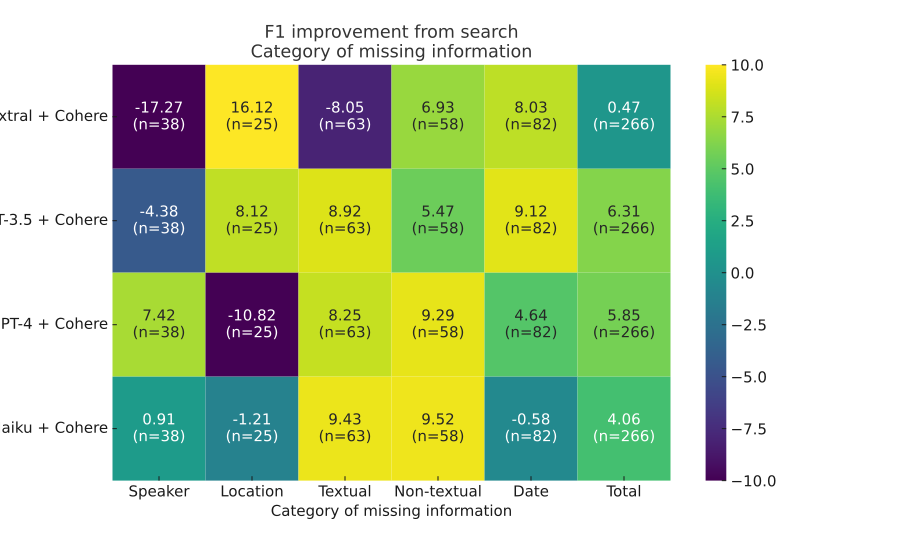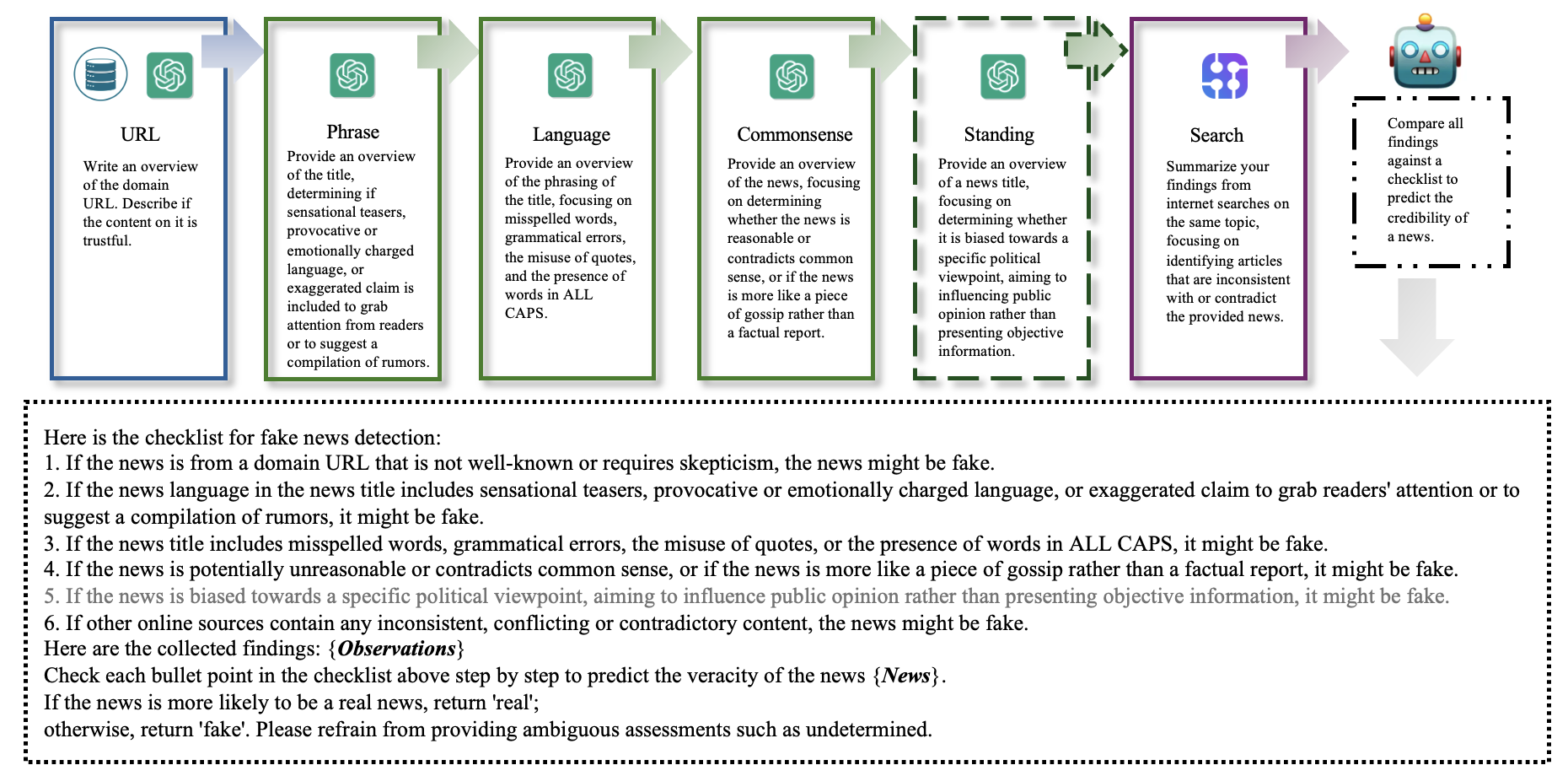Web Retrieval Agents for Evidence-Based Misinformation Detection

0

Sign in to get full access
Overview
- A research paper that presents a novel approach for detecting misinformation on the web using web retrieval agents.
- The proposed system combines natural language processing, information retrieval, and knowledge-based reasoning to identify and provide evidence for or against claims.
- The system aims to help users make informed decisions by giving them access to relevant, high-quality information from the web.
Plain English Explanation
The research paper describes a new system that uses web-based agents to help detect misinformation. These web retrieval agents can automatically search the internet for information related to a claim and then evaluate the evidence to determine if the claim is true or false.
The key idea is to combine different technologies, like natural language processing and information retrieval, to create a system that can quickly find relevant information from the web and then use knowledge-based reasoning to assess the credibility of a claim.
The goal is to empower users to make more informed decisions by giving them access to reliable, evidence-based information. This could be especially useful in the context of detecting and addressing misinformation, which has become a significant challenge in the digital age.
Technical Explanation
The paper describes a system that uses web retrieval agents to gather and evaluate evidence for or against claims made online. The key components of the system include:
-
Claim Processing: The system first analyzes the claim using natural language processing techniques to extract the key entities, concepts, and relationships.
-
Web Retrieval: The system then uses information retrieval techniques to search the web for relevant information that can provide evidence to support or refute the claim.
-
Evidence Evaluation: The system evaluates the collected evidence using knowledge-based reasoning to assess the credibility and reliability of the information sources.
-
Misinformation Detection: Finally, the system combines the claim analysis and evidence evaluation to determine whether the original claim is likely to be true or false, and provides a summary of the key evidence.
The researchers evaluated the system's performance on a dataset of real-world claims and found that it was able to effectively identify and provide evidence for misinformation, outperforming other state-of-the-art approaches.
Critical Analysis
The research presented in this paper offers a promising approach to addressing the challenge of misinformation detection on the web. By leveraging a combination of natural language processing, information retrieval, and knowledge-based reasoning, the system is able to provide users with a more comprehensive and evidence-based evaluation of claims.
One potential limitation of the system is its reliance on the quality and accuracy of the information available on the web. If the web contains limited or biased information on a particular topic, the system may struggle to find sufficient evidence to make a reliable assessment.
Additionally, the system may face challenges in keeping up with the rapid spread of misinformation, as new claims and false narratives can emerge quickly online. Ongoing maintenance and updates to the system's knowledge base may be necessary to ensure its effectiveness over time.
Further research could explore ways to enhance the system's adaptability and robustness, such as by incorporating machine learning techniques or multimodal approaches to better identify and respond to evolving misinformation trends.
Conclusion
The research presented in this paper represents an important step towards developing more effective tools for detecting and addressing misinformation on the web. By combining advanced natural language processing, information retrieval, and knowledge-based reasoning, the proposed web retrieval agent system offers a promising approach to empowering users with reliable, evidence-based information.
As misinformation continues to pose challenges in the digital age, this type of research could have significant implications for improving public discourse, promoting critical thinking, and supporting informed decision-making. Further advancements in this area could help create a more informed and discerning online environment.
This summary was produced with help from an AI and may contain inaccuracies - check out the links to read the original source documents!
Related Papers


0
Web Retrieval Agents for Evidence-Based Misinformation Detection
Jacob-Junqi Tian, Hao Yu, Yury Orlovskiy, Tyler Vergho, Mauricio Rivera, Mayank Goel, Zachary Yang, Jean-Francois Godbout, Reihaneh Rabbany, Kellin Pelrine
This paper develops an agent-based automated fact-checking approach for detecting misinformation. We demonstrate that combining a powerful LLM agent, which does not have access to the internet for searches, with an online web search agent yields better results than when each tool is used independently. Our approach is robust across multiple models, outperforming alternatives and increasing the macro F1 of misinformation detection by as much as 20 percent compared to LLMs without search. We also conduct extensive analyses on the sources our system leverages and their biases, decisions in the construction of the system like the search tool and the knowledge base, the type of evidence needed and its impact on the results, and other parts of the overall process. By combining strong performance with in-depth understanding, we hope to provide building blocks for future search-enabled misinformation mitigation systems.
Read more9/4/2024


0
Large Language Model Agent for Fake News Detection
Xinyi Li, Yongfeng Zhang, Edward C. Malthouse
In the current digital era, the rapid spread of misinformation on online platforms presents significant challenges to societal well-being, public trust, and democratic processes, influencing critical decision making and public opinion. To address these challenges, there is a growing need for automated fake news detection mechanisms. Pre-trained large language models (LLMs) have demonstrated exceptional capabilities across various natural language processing (NLP) tasks, prompting exploration into their potential for verifying news claims. Instead of employing LLMs in a non-agentic way, where LLMs generate responses based on direct prompts in a single shot, our work introduces FactAgent, an agentic approach of utilizing LLMs for fake news detection. FactAgent enables LLMs to emulate human expert behavior in verifying news claims without any model training, following a structured workflow. This workflow breaks down the complex task of news veracity checking into multiple sub-steps, where LLMs complete simple tasks using their internal knowledge or external tools. At the final step of the workflow, LLMs integrate all findings throughout the workflow to determine the news claim's veracity. Compared to manual human verification, FactAgent offers enhanced efficiency. Experimental studies demonstrate the effectiveness of FactAgent in verifying claims without the need for any training process. Moreover, FactAgent provides transparent explanations at each step of the workflow and during final decision-making, offering insights into the reasoning process of fake news detection for end users. FactAgent is highly adaptable, allowing for straightforward updates to its tools that LLMs can leverage within the workflow, as well as updates to the workflow itself using domain knowledge. This adaptability enables FactAgent's application to news verification across various domains.
Read more5/6/2024


0
Large-Language-Model-Powered Agent-Based Framework for Misinformation and Disinformation Research: Opportunities and Open Challenges
Javier Pastor-Galindo, Pantaleone Nespoli, Jos'e A. Ruip'erez-Valiente
This article presents the affordances that Generative Artificial Intelligence can have in misinformation and disinformation contexts, major threats to our digitalized society. We present a research framework to generate customized agent-based social networks for disinformation simulations that would enable understanding and evaluating the phenomena whilst discussing open challenges.
Read more4/30/2024
🌿

0
AMIR: Automated MisInformation Rebuttal -- A COVID-19 Vaccination Datasets based Recommendation System
Shakshi Sharma, Anwitaman Datta, Rajesh Sharma
Misinformation has emerged as a major societal threat in recent years in general; specifically in the context of the COVID-19 pandemic, it has wrecked havoc, for instance, by fuelling vaccine hesitancy. Cost-effective, scalable solutions for combating misinformation are the need of the hour. This work explored how existing information obtained from social media and augmented with more curated fact checked data repositories can be harnessed to facilitate automated rebuttal of misinformation at scale. While the ideas herein can be generalized and reapplied in the broader context of misinformation mitigation using a multitude of information sources and catering to the spectrum of social media platforms, this work serves as a proof of concept, and as such, it is confined in its scope to only rebuttal of tweets, and in the specific context of misinformation regarding COVID-19. It leverages two publicly available datasets, viz. FaCov (fact-checked articles) and misleading (social media Twitter) data on COVID-19 Vaccination.
Read more7/29/2024